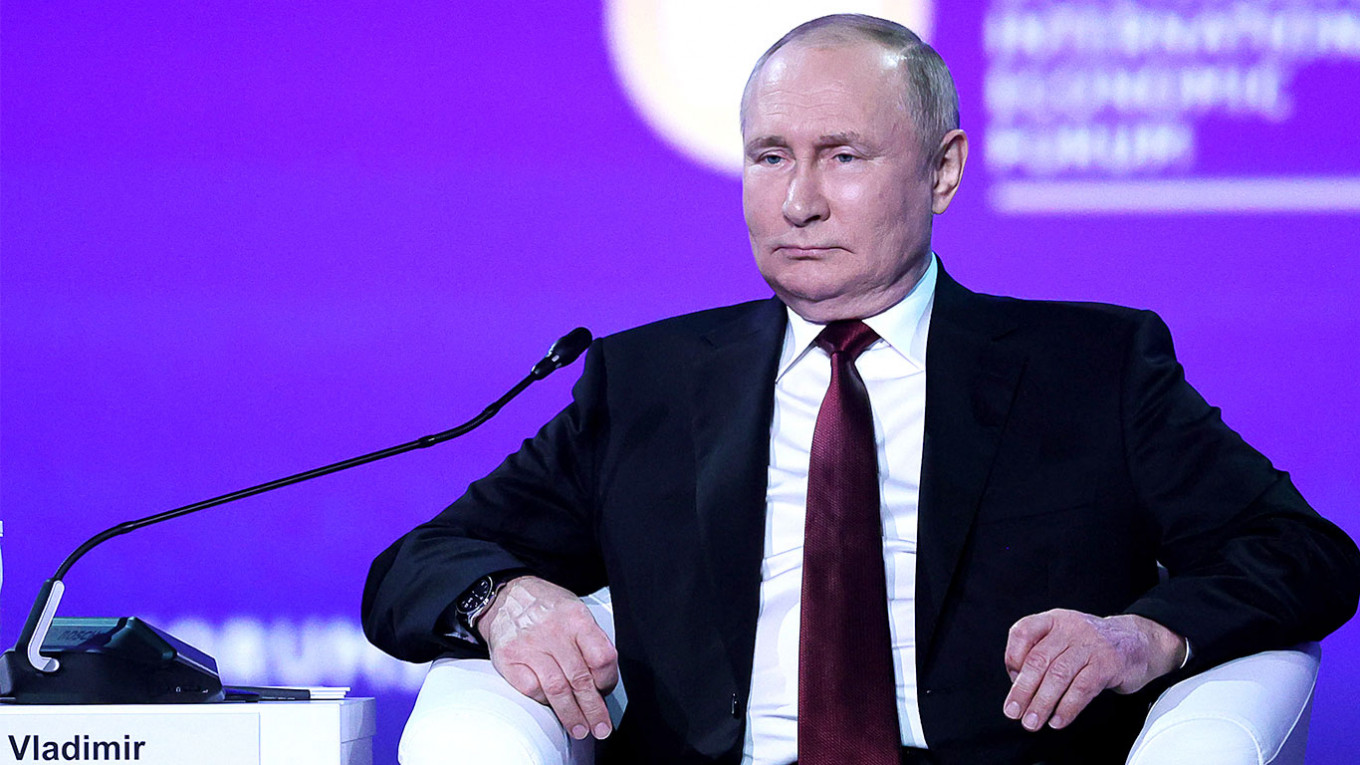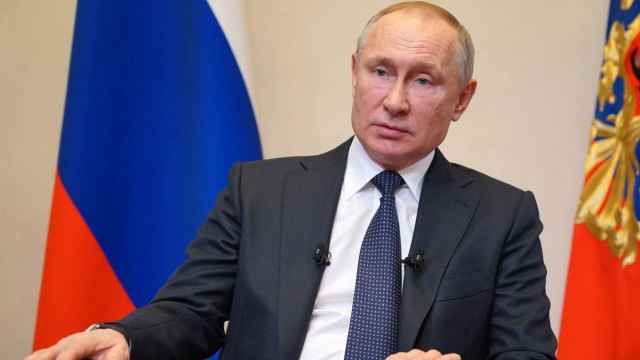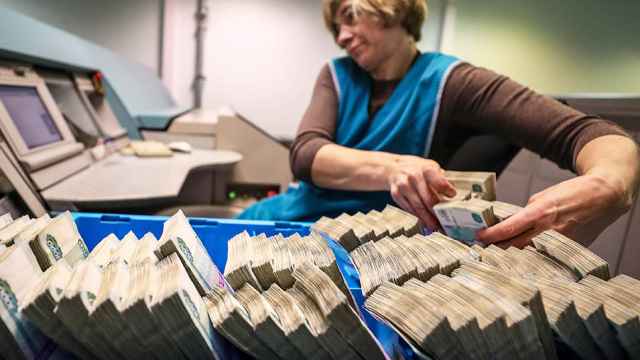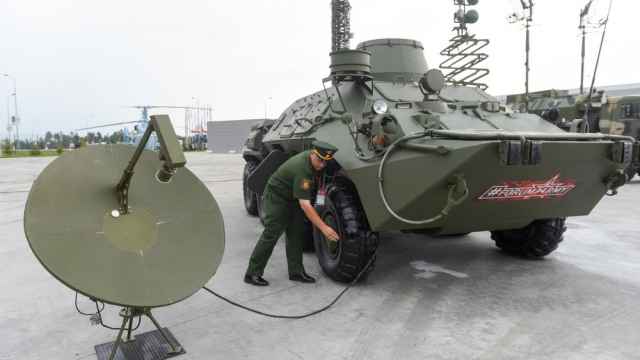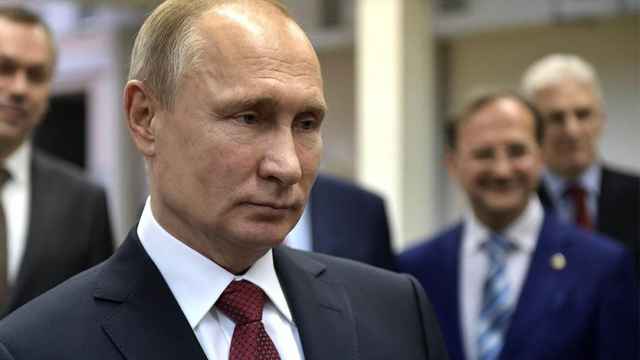Russian President Vladimir Putin slammed the West’s “economic blitzkrieg” and vowed that Russia would withstand sanctions levied over its invasion of Ukraine in his address at the St. Petersburg International Economic Forum (SPIEF) Friday.
After starting nearly two hours late due to alleged cyberattacks, the Russian president delivered an impassioned speech that scorned the U.S.-led West for trying to destabilize the Russian economy and championed his country’s ability to weather the “mindless” sanctions.
“The economic blitzkrieg against Russia never had any chances of success,” Putin said. “Like our ancestors, we will solve any problem; the entire thousand-year history of our country speaks of this.”
The Russian president addressed a more muted crowd at this year’s SPIEF — the annual business conference once known as “Russia’s Davos” — as the fallout from his devastating invasion of Ukraine meant many international delegations boycotted the event.
In his speech, Putin blamed the West for Russia’s economic hardships in 2022 and of deliberately attempting to stunt the Russian economy.
"Core business concepts are thoroughly undermined by our partners in the West intentionally for the sake of ambitions,” Putin said.
But he went on to say these Western efforts failed.
“Gloomy predictions about the Russian economy’s future didn't come true," Putin said.
Earlier at the forum, the head of Russia’s largest bank Sberbank warned that Russia could face a 10-year recession if it doesn’t take steps to adapt to sanctions.
Economists have also said that Russia likely won’t feel the worst impacts of sanctions until later in 2022.
Unlike many other officials who spoke at the four-day-long forum, Putin directly addressed the topic of Ukraine, repeating that Russia was left with little other choice but to invade its pro-Western neighbor.
"Against a backdrop of increasing risks and threats to us, Russia's decision to conduct a special military operation was forced — difficult, of course, but forced and necessary," the president said.
In spite of the West’s attempts to weaken a “sovereign, independent Russia,” Putin vowed that the “special military operation” would continue, adding that Russia would “undoubtedly” achieve its goals in Ukraine.
Instead, he claimed, Western leaders have only brought the sovereignty of their own nations into question and threatened a global food shortage that could impact millions in their efforts to “destabilize” Russia.
“Famine in the poorest countries will be on the conscience of the U.S. administration and the Eurocrats," Putin said.
The West has repeatedly accused Russia of deliberately targeting Ukrainian grain stores, something that threatens widespread famine as the two warring nations account for nearly one-third of the global grain supply.
Speaking after the European Commission recommended granting Kyiv EU candidate status, Putin said Russia has "nothing against" Ukraine's possible European Union membership.
"We have nothing against it. It's their sovereign decision to join economic unions or not... It's their business, the business of the Ukrainian people," Putin said.
Russia takes a very dim view of Kyiv's aspirations to join NATO — which Moscow considers a threat to its security.
But "as far as their economic integration is concerned, it is their choice," Putin said.
"The EU is not a military alliance, unlike NATO," he said.
He did, however, say he believed that if Ukraine went ahead with joining the EU it would "turn into a semi-colony" of Western countries.
"That's my opinion," he said.
AFP contributed reporting.
A Message from The Moscow Times:
Dear readers,
We are facing unprecedented challenges. Russia's Prosecutor General's Office has designated The Moscow Times as an "undesirable" organization, criminalizing our work and putting our staff at risk of prosecution. This follows our earlier unjust labeling as a "foreign agent."
These actions are direct attempts to silence independent journalism in Russia. The authorities claim our work "discredits the decisions of the Russian leadership." We see things differently: we strive to provide accurate, unbiased reporting on Russia.
We, the journalists of The Moscow Times, refuse to be silenced. But to continue our work, we need your help.
Your support, no matter how small, makes a world of difference. If you can, please support us monthly starting from just $2. It's quick to set up, and every contribution makes a significant impact.
By supporting The Moscow Times, you're defending open, independent journalism in the face of repression. Thank you for standing with us.
Remind me later.


